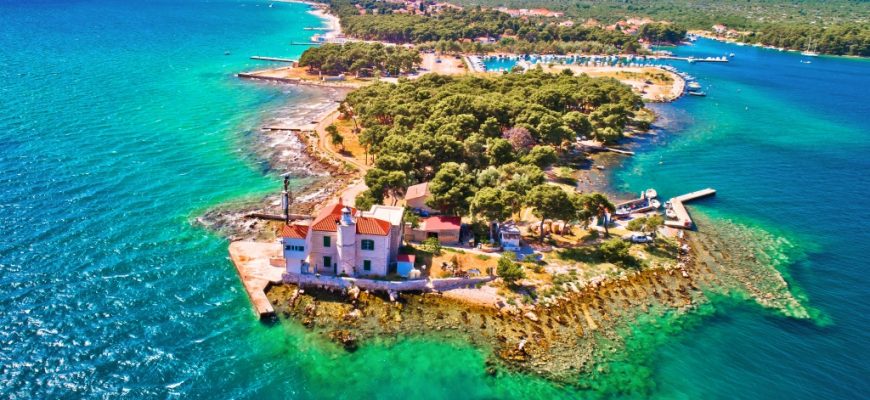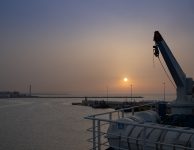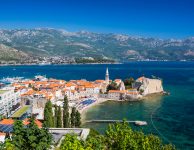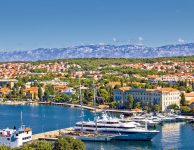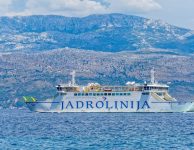A new Law on Maritime Property is being prepared: Rigorous penalties, completely new control mechanisms!
The Ministry of the Sea, Transport and Infrastructure has drafted a new Law on Maritime Property and Seaports. A working group is also meeting to prepare the legislation for public discussion, while the Morski Hr has learned what the long-awaited Act is, which should finally bring order to the coast.
The enactors of the new Act believe that this Draft creates appropriate systematic and precise legal regulations that follow modern generally accepted European and world achievements, which is a necessary precondition for the faster and more successful economic development of the Republic of Croatia as a maritime country, creating conditions for investments in the maritime domain, and especially in the port superstructure.
A set of necessary changes
If adopted, the new law brings a lot of novelties, both in the regulatory and the restrictive part. Here are the most basic changes:
- An entire sector is introduced for the purpose of controlling the maritime domain;
- The law should make it easier to register maritime property plots in the land register;
- Sanctions for violators are defined;
- The procedure for granting concessions on the maritime property is being changed in order to harmonize with the Law on Concessions;
- The institute of concession on demand is introduced;
- The duty of the concession grantor to carry out preparatory activities for the granting of a concession in accordance with the procedures and actions determined by the Law on Concessions is introduced;
- Concession approvals are revoked, and permits are issued, which are issued by the representative body of the local self-government unit on the basis of a public tender for a period of five years;
- Sea beaches, anchorages and moorings are defined;
- A time limit is set for regulating the issue of filling the sea;
- The right and duty to participate in the ministry responsible for maritime affairs in the process of drafting and adopting all documents and acts of spatial planning that cover the area of maritime domain is introduced;
- In the units of regional self-government, one county port administration is established, which may have branches;
- The duty of the County Port Authority to perform port activities itself is introduced, while the concession for performing port activities is granted only exceptionally and exclusively for the construction and economic use of new facilities and superstructures, acceptance and delivery of all types of marine waste and fuel supply of vessels. ;
- A single port tariff is introduced in ports open to public traffic of county and local importance, which combines port dues and port taxes;
- Port wardens are being introduced to supervise the implementation of the port order in ports open to public traffic.
A clearer definition of the maritime domain
The new Draft Law defines the concept of maritime property more precisely, so the important fact remains that everyone has the right, under equal conditions, to use maritime property in accordance with its nature and purpose, but added a part “except when prescribed differently by this Act”, in order to define that part more clearly.
As for the land part of the maritime domain, it is defined as a land area by the sea that by its nature or purpose serves the immediate or usual use and use of the sea regardless of its width, but which is at least 6 meters wide from the line of medium-high waters. The maritime domain also includes all real estate within the port area.
The boundary of the maritime domain is a defined line that separates the terrestrial part of the maritime domain as a common good from the part of the land that can be the subject of ownership. The Commission for Maritime Property Borders of the regional self-government unit is obliged to determine the border of the maritime domain in the areas where the cadastral survey procedure is carried out, and a new cadastral survey cannot be carried out until the border of the maritime domain is determined. Everything will be controlled only by the Ministry of the Sea.
As in the existing Act, the definition of the impossibility of acquiring property rights or other rights to the maritime property remains, but it is also defined that buildings on the maritime property are permanently connected with maritime property and belong to it. Real estate in the maritime domain will not be subject to sale at public auction, lease and rent cannot be based on them, but only the rights prescribed by the new Law, and all legal transactions concluded contrary to the new definition will simply become null and void.
The construction of buildings in the maritime domain, which are not in a functional connection with the sea or changing the purpose of a particular part of the maritime domain according to spatial plans, does not change the status of the maritime domain.
According to the above-mentioned novelties in the Law, the legislator will try to put an end to savage investors, but also to certain local self-governments that have squinted or deliberately devastated and illegally built on the maritime property. For this purpose, the Republic of Croatia, represented by the competent State Attorney’s Office, may take all actions to protect maritime property, as well as file lawsuits, seek damages against persons who used maritime property without legal basis or usurped, devastated, etc., and thus achieved a certain benefit or caused damage by their actions or prevented it from being used well in accordance with its status and purpose.
With the above-mentioned novelties in the Law, the legislator will try to put an end to savage investors, but also to certain local self-governments that, by squinting or intentionally, devastated and illegally built on the maritime property. For this purpose, the Republic of Croatia, represented by the competent State Attorney’s Office, may take all actions to protect maritime property, as well as file lawsuits, seek damages against persons who used maritime property without legal basis or usurped, devastated, etc., and thus achieved a certain benefit or caused damage by their actions or prevented it from being used well in accordance with its status and purpose.
Arbitrariness is forbidden
Although this should not be allowed under the existing Law, the new Draft Law explicitly states that no one should arbitrarily exclude or limit in any way a maritime good from general use or occupy it for themselves or others.
No one has the right without a valid act which represents a valid legal basis determined by this Law:
- use maritime property economically,
- perform activities in the maritime domain,
- build and/or perform other works and/or interventions in the area of maritime property,
- fill the sea,
- restrict or exclude the general use of the maritime domain in any way to occupy the maritime domain for oneself or another,
- to invoke in relation to state bodies or other natural and legal persons any right or authority which he would have had if such an act had been obtained in accordance with the provisions of this Act and the regulations adopted pursuant thereto.
No one may prohibit or deny persons in distress access to any part of the maritime domain, including those parts which are excluded from general use or whose general use is restricted.
Local self-government units will respect the law or be deprived of their powers
The fact is that throughout the Adriatic, local self-government units headed by elected local sheriffs, to whom communal wardens, most often out of fear of them, could do nothing, violated and cheated on the existing laws. To resolve this Gordian knot, the Ministry wants to introduce new methods.
If in performing administrative supervision, the Ministry finds illegalities or irregularities, insufficient training or improper attitude of officials towards citizens, it is authorized to request appropriate reports and data and directly establish the facts, and determine in writing the measures to be taken to eliminate identified irregularities and ensure legal, proper and timely performance of state administration tasks that are subject to supervision.
If the unit of local or regional self-government or the port authority does not follow the instructions within the set deadline, the Ministry will, among other things, be authorized and propose to the Government of the Republic of Croatia a decision on the temporary revocation of the unit of local self-government for the performance of delegated state administration tasks and the assignment of their performance to the competent unit of regional self-government, including the right to income from the performance of these tasks, in time until the execution of administrative supervision measures.
Investors in illegally constructed buildings in the maritime domain do not have any rights
If a building is built on an embankment and/or land part of a maritime domain, which is not functionally related to the use of the sea, but remains in space, the land below that building and the land used to access that building, that is determined by the rules on determining the necessary passage, is excluded from the maritime domain.
Persons who can prove a valid legal basis for the use of a building, after the boundary of maritime domain and buildings is determined, land under that building and land used for access to that building, registered as property of the Republic of Croatia, are obliged, within 6 months from the date of registration, to request from the central state administration body responsible for the disposal and management of state property the establishment of the right to build or the conclusion of a contract of sale.
Buildings such as piers, sunbathing areas, stretchers, breakwaters and waterfronts built before 2011 without valid documentation remain in space if they are in accordance with the spatial plan of the local government, but it is clearly defined that builders or investors have no rights on basics of the construction of these buildings.
Construction and other interventions in the area of the maritime domain are not allowed.
Maritime property inspectors who automatically file criminal charges with the State Attorney’s Office are being introduced
The inspection of the maritime domain will be performed by inspectors of the maritime domain, in accordance with the provisions of the new Act and regulations governing the work of port authorities. The Inspector of Maritime Property is authorized to perform all inspection activities and take all inspection measures prescribed by the new Act, in the entire area of maritime property of the Republic of Croatia in general and special use, without restrictions.
If the inspection determines that a criminal offence has been committed by violating the regulations, the inspector of the maritime property will automatically file a criminal complaint against such a perpetrator with the competent State Attorney’s Office.
Inspectors will be able to urgently prevent illegal behaviour, so they can orally impose a measure prohibiting the use of the maritime property on the spot by placing an official prohibition sign or sealing the object of control and/or means by which illegal behaviour on the maritime property is performed, without passing the special decision on execution. In that case, the subject of supervision will have to act immediately and without delay according to the oral decision!
Preservation of maritime property
Although they have been obliged to do so far, this time it is precisely defined that local self-government units are obliged to protect the right to the general use of the maritime property and are obliged to report any illegal actions, unauthorized occupation, the devastation of maritime property and embankment to the competent inspection bodies.
Funds from the collection of fines, according to the regulations on communal economy, in the maritime domain are the revenue of local self-government units and are used for regular maintenance and protection of maritime assets in general use.
Permits for the use of maritime property
One of the novelties is the introduction of permits. It is an act by which the authorized person is given a time-limited right on the basis of which the activity is performed in the maritime domain, which does not limit or exclude the general use of the maritime domain.
To perform the activity, a simple building is used – a kiosk and other simple buildings for the needs of fairs and public events for which it is not necessary to obtain a building permit and the main project, in accordance with the regulations governing simple buildings.
Rigorous penalties for violators
In addition to precise legal regulations, citizens were eagerly awaiting the penal provisions of the new law, which should finally deter violators from coastal devastation and illegal activities. In the new Draft Law on Maritime Property and Seaports, the legislator envisages fines for certain offences of up to one million kuna! This time, he will not spare the local government, nor the sheriffs who treated the maritime property as their property.
A fine of HRK 50,000.00 to HRK 250,000.00 will be imposed on a local government unit for a maritime offence if it fails to protect the right to the general use of maritime property, does not prevent illegal conduct, unauthorized occupation, the devastation of maritime property and has not immediately notified the competent inspection body. The head of the local self-government unit will also be fined HRK 10,000.00 to HRK 50,000.00 for the same offence.
A fine of HRK 50,000.00 to HRK 250,000.00 shall be imposed on legal and natural persons for a maritime offence for the illegal performance of works and interventions in the area of maritime property, filling of the sea, restriction or exclusion of part of the maritime property from general use and other authorizations pursuant to the provisions of this Act.
If he does not use this authorization in the manner, to the extent and within the limits determined by the act by which they acquired this authorization and in accordance with the provisions of this Act and other regulations adopted on the basis thereof. For the same offence, the responsible person in the legal entity will be fined HRK 10,000.00 to HRK 50,000.00.
A fine of HRK 50,000.00 to HRK 250,000.00 shall be imposed on a legal entity for a maritime offence:
- if the maritime good is used economically without a concession contract, special use permit or permits, ie decisions on granting temporary special use or economic use to the maritime good;
- if it builds/sets up a facility on a maritime domain without a legal basis provided by the provisions of this Law or regulations governing concessions;
- if it fills the sea contrary to spatial plans;
- if it fills the sea contrary to spatial plans;
- if persons in distress are denied access to the maritime domain.
For all of the above, penalties are prescribed separately for natural and legal persons, but also for craftsmen.
A fine in the amount of 10,000.00 to 30,000.00 kuna will be imposed on the mayor:
- if it does not take the necessary actions on the maritime domain in general use;
- if it does not provide data on beaches
A fine of HRK 3,000.00 to HRK 15,000.00 will be imposed on a legal entity that does not comply with the regulations governing the order in the port, if it pollutes the sea or discards waste, illegally places objects, facilities, devices, advertisements and billboards and if it uses port facilities, devices and tools that have been determined to have deficiencies. For the same offence, the responsible person in the legal entity will be fined from HRK 1,000.00 to HRK 5,000.00
The most rigorous fine in the amount of HRK 500,000.00 to 1,000,000.00 shall be imposed on a legal entity that fails to remove affiliation to the maritime domain and everything it has placed on the maritime domain without a valid legal basis prescribed by this Act and other regulations, which regulate the maritime domain and the concession on the maritime domain. For the same offence, the responsible person in the legal entity will be fined in the amount of 40,000.00 to 50,000.00 kuna.
Introduction of order in the Adriatic
These are the basic contours of the new Draft Law on Maritime Property and Seaports, which will certainly resonate with the public because it should finally bring order to the Wild West in the Adriatic from Savudrija to Prevlaka.
More clearly defined legal acts, a completely new sector of control of compliance with the law, independent inspections and supervision, and rigorous penalties, should be a guarantee of the preservation of maritime property, as a public good for all of us. Of course, the working group will still discuss this Draft and possibly finalize it, and then it will go to a public debate, after which two readings in Parliament should take place. If all goes well, they could have a new and more concrete Law on Maritime Property and Seaports by the end of this year.
source: morski hr


